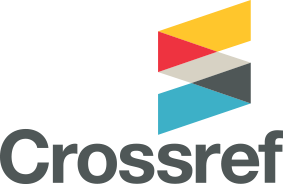Ajwa Date (Phoenix dactylifera L.) Extract to Prevent Alzheimer’s Disease in Rat Model
Abstract
Alzheimer's disease (AD) is the most common disease of aging characterized by increased extracellular deposits of amyloid-β (Aβ) in the brain. Globally, the number of people affected by AD has increased from 35.6 million in 2010 to 46.8 million in 2015. Ajwa dates contain phenolic compounds that can protect against inflammation and oxidative stress in the brain. This study aimed to analyze the effect of the dose and duration of Ajwa date extract administration on IL-6 levels and SOD activity in rats induced with 400 mg/day homocysteine to trigger Alzheimer's Disease. This was a laboratory experimental study with a pretest-posttest group design conducted at the Laboratory of the Center for Food and Nutrition Studies (PSPG), Universitas Gadjah Mada, Yogyakarta, Indonesia from December 2020 - January 2021. A total of 48 rats were divided into one control group, one untreated group, and 4 treatment groups that received different doses of Ajwa Date Extract (ADE) for 21 and 28 days in rats. The results showed that the administration of ADE (Ajwa date extract) for 21 and 28 days could reduce IL-6 levels but did not have the same effectiveness as donepezil. The administration of 800 mg/kg BW ADE for 28 days can increase SOD activities with the same effectiveness as donepezil. Ajwa date extract can be proven to have beneficial effects to prevent Alzheimer's disease and can be used to prevent decreased antioxidant and increased inflammation. Thus, further studies to explore the potential clinical use of the extract to manage Alzheimer's Disease may be beneficial.
Keywords
Full Text:
PDFReferences
- Alzheimer’s Association. 2016 Alzheimer’s disease facts and figures. Alzheimers Dement. 2016;12:459–509.
- Subash S, Essa MM, Al-Asmi A, Al-Adawi S, Vaishnav R et al. Effect of dietary supplementation of dates in alzheimer’s disease appsw/2576 transgenic mice on oxidative stress and antioxidant status. Nutr Neurosci. 2015;18(6):281–8.
- Alzheimer’s Disease International. World Alzheimer Report 2015, The global impact of dementia, an analysis of prevalence, incidence, cost and trends. london: alzheimer’s disease International (ADI); 2015.
- Huang WJ, Zhang X, Chen WW. Role of oxidative stress in alzheimer disease. Biomed Rep. 2016;4(5):519–22.
- Ataie A, Shadifar M, Ataee, R. Polyphenolic antioxidants and neuronal regeneration. Basic Clinical Neurosci. 2016;7(2):81–90.
- Essa MM, Akbar M, Khan MAS. Beneficial effects of date palm fruits on neurodegenerative Diseases. Neural Regen Res.2016;264:1071–2.
- Gruol, Donna L. IL-6 regulation of synaptic function in the CNS. Neuropharmacology. 2014;96:42–54.
- Xu PX, Shao-wei W, Xiao-lin Y, Ya-jing S, Teng W, et al. Improves spatial memory in alzheimer’s disease transgenic mice by reducing Aβ oligomer level and attenuating oxidative stress and neuroinflammation. Behav Brain Res. 2014;264:173–80.
- Al-Yahya M, Raish M, AlSaid MS, Ahmad A, Mothana RA, Al-Sohaibani M, et al. Ajwa dates (phoenix dactylifera l.) extract ameliorates isoproterenolinduced cardiomyopathy through downregulation of oxidative, inflammatory and apoptotic molecules in rodent model. Phytomedicine. 2016;23(11):1240–8.
- Rodrigues GP, Cozzolino SMF, Marreiro DDN, Caldas DRC, da Silva KG, et al. Mineral status and superoxide dismutase enzyme activity in alzheimer’s disease. J Trace Elem Med Biol. 2017;44:83–7.
- Mahaman YAR, Huang F, Wu M, Wang Y, Wei Z, Bao J, et al. Moringa oleifera alleviates homocysteine induced alzheimer’s disease-like pathology and cognitive impairments. J Alzheimers Dis. 2018;63(3):1141–59.
- El-Far AH, Shaheen HM, Abdel-Daim MM. Date palm (Phoenix dactylifera): protection and remedy food. Curr Trends Nutraceuticals. 2016;1(2);1–10.
- Khan F, Khan TJ, Kalamegam G, Pushparaj PN, Chaudhary A, et al. Anti-cancer effects of ajwa dates (Phoenix dactylifera L.) in diethylnitrosamine induced hepatocellular carcinoma in wistar rats. BMC Complement Altern Med. 2017;17(1):1–10.
- El Abed H, Mouna C, Zaineb A, Noureddin D, Naziha M, Hafedh M, Bassem K. Antioxidant, anti-inflammatory, and antitumoral effects of aqueous ethanolic extract from phoenix dactylifera l. parthenocarpic dates. Biomed Res Int. 2018;2018:1–7
- Pujari RR, Neeraj SV, Prasad A, Thakurdesai C. Protective effects of phoenix dactylifera against oxidative stress and neuronal damage induced by global cerebral ischemia in rats. Biomedicine Aging Pathol. 2013;3:75–81.
- Hussain SM, Awwad IA, Taha M dan Khan O. A laboratory quest on use of date fruit (Phoenix dactylifera L) extract in prevention of chemically induced memory deficit in mice. Asian J Biomed Pharmaceutical Sci. 2015;5(49):5–11.
- Winarsi H, Alice Y, Agus P. Aging detection in female based on antioxidant status. Majalah Kedokteran Bandung. 2013;45(3):141–6.
- Winarsi H, Siwi PMW, Agus P. The activity of superoxide dismutase, catalase, and glutathione peroxidase enzymes in metabolic syndrome women. Majalah Kedokteran Bandung. 2012;44(1):7–12.
- Taleb H, Maddocks SE, Morris RK, Kanekanian AD. Chemical Characterisation and The Anti-Inflammatory, Anti-Angiogenic and Antibacterial Properties of Date Fruit (Phoenix dactylifera L.). J Ethnopharmacol. 2016;94:457–68.
- Zhang CR, Aldosari SA, Vidyasagar PS, Shukla P, Nair MG. Health-benefits of date fruits produced in Saudi Arabia based on in vitro antioxidant, anti-inflammatory and human tumor cell proliferation inhibitory assays. J Saudi Society Agricultural Sci. 2017;16(3):287–93.
- Alqarni MM, Magdi AO, Dalia SA, Mustafa AG, Abdulrahman SA, et al. Antioxidant and antihyperlipidemic effects of ajwa date (Phoenix dactylifera L.) extracts in rats fed a cholesterol‐rich diet. J Food Biochem. 2018;43(8):1–12.
- Ali Z, Jianke L, Yuhuan Z, Naureen N, Shoaib Y, Farah J. Dates (Phoenix Dactylifera) and date vinegar: preventive role against various diseases and related in vivo mechanisms. Food Rev Int. 2020;38(4):480–507.
- Rizma, Amalina. Pengaruh Dosis dan Lama Pemberian Ekstrak Buah Kurma Ajwa (Phoenix Dactylifera L.) terhadap Memori, Kadar MDA dan SOD pada Tikus Model Alzheimer [thesis]. Surakarta: Universitas Sebelas Maret; 2022.
DOI: https://doi.org/10.15395/mkb.v55n1.2871
Article Metrics
Abstract view : 2687 timesPDF - 684 times

This work is licensed under a Creative Commons Attribution-NonCommercial 4.0 International License.

MKB is licensed under a Creative Commons Attribution-NonCommercial 4.0 International License
View My Stats






